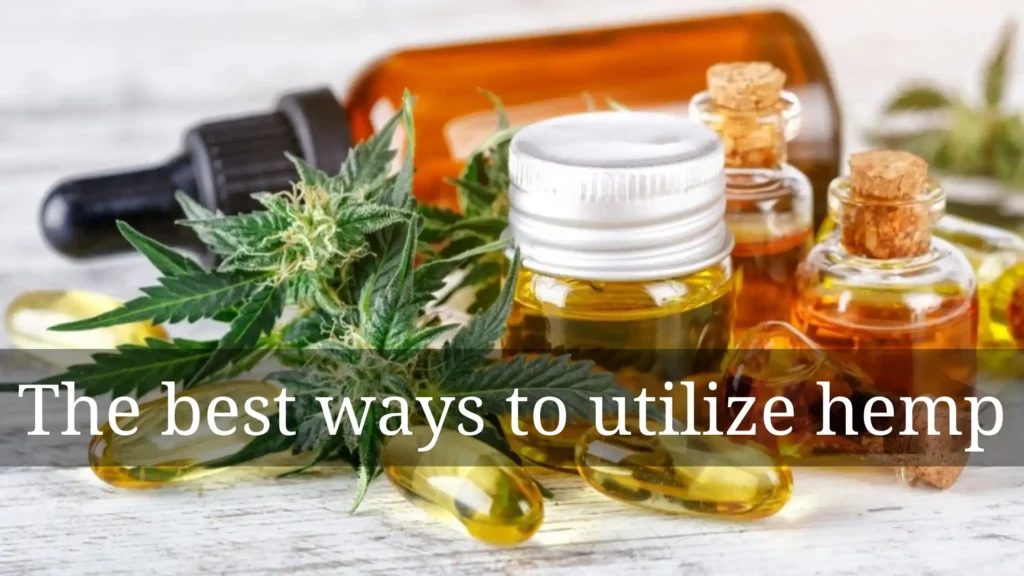Understanding the best ways to utilize Hemp
For thousands of years, hemp has been an undisputable part of human civilizations and traditions. Hemp has vital potential, for which it is prospering our lives from ancient to modern times. In a modern scenario, hemp has been contributing to many industries and our day-to-day lives. Hemp has incomparable ways of utilization, which many people are not aware of. Likewise, it’s oil, and people are unaware of how to use hemp oil.
The benefits of cultivating hemp, such as less water consumption and no use of pesticides, are captivating farmers toward its cultivation. Additionally, the power of hemp to absorb a lot of carbon dioxide from the environment is revamping the hemp industry.
Hemp has immense benefits and potential uses. This blog will explore the best ways to utilize hemp. We will also explore its potential benefits and how it is transforming various industries, promoting sustainability, and improving the overall well-being of people.
Hemp for Industrial Uses
Hemp Textiles and Fibers: Hemp fibers are recognized for being strong and long lasting, making them perfect for use in textile and apparel production. In addition to being durable, hemp cloth is also permeable, antibacterial, and biodegradable. Adopting hemp textiles encourages eco-friendly design and lowers the textile industry’s carbon impact.
Building Supplies: Hempcrete, a sustainable substitute for conventional concrete, is made from hemp fibers. Hempcrete is carbon-negative, lightweight, and has good insulating qualities. It also absorbs more carbon dioxide during manufacturing than it releases. The use of this cutting-edge building material is growing in favor of green building techniques.
Production of Biofuel: Hemp oil, which may be used to make biofuel, can be extracted from hemp seeds by processing. Hemp biofuel is an environmentally favourable energy source since it is renewable, biodegradable, and emits fewer greenhouse gases than fossil fuels.
Hemp in Health and Wellness
Nutritional Advantages: Hemp seeds are a great source of protein, fiber, omega-3 and omega-6 fatty acids, as well as several vitamins and minerals. Its seeds can benefit our digestion, heart health, and general well-being through dietary use. There are also numerous benefits of hemp seed oil for skin nurturing and extending skin health.
CBD and Medical Applications: Cannabidiol (CBD), a non-psychoactive chemical with possible medicinal benefits, is mostly found in hemp. CBD has shown promise in the treatment of inflammation, pain, anxiety, and several neurological conditions. As CBD research advances, its therapeutic uses are anticipated to increase, providing a natural substitute for traditional medications.
Products for skincare and beauty: A great moisturizer that moisturises and nourishes the skin without blocking pores is hemp seed oil. Additionally, it contains anti-inflammatory qualities that help calm inflamed skin issues, including eczema and acne. Because they are organic and environmentally friendly, skincare products made from hemp have gained popularity in the beauty market.
Hemp in Agriculture
Soil regeneration and crop rotation: Hemp is a superb rotating crop that enhances the fertility and health of the soil. Its rapid growth rate kills weeds, while its extensive root system helps loosen up compacted soil. Due to its capacity to absorb surplus nutrients, hemp encourages the use of sustainable agriculture methods.
Phytoremediation: Hemp is an exceptional phytoremediator, which means that it can detoxify and absorb contaminants from the soil and water. Hemp is a useful cleaning agent for polluted regions, especially those affected by heavy metals and industrial pollution.
Hemp for Environmental Conservation
Support for Biodiversity: By providing shelter and food for a range of species, including insects and birds, hemp production fosters biodiversity. Ecosystem preservation can benefit from promoting hemp production along with ethical land management techniques.
Cutting down on deforestation: As the market for wood and paper goods expands, deforestation becomes a major issue. A more environmentally friendly option is hemp paper, which can be manufactured without destroying trees and with fewer chemicals.
Hemp in the Textile and Fashion Industry
Movement for Sustainable Fashion: One of the major producers of trash and environmental damage is the fashion industry. Hemp textiles provide a greener option to traditional materials by using fewer resources, emitting less carbon, and biodegrading more quickly. Supporting brands of apparel made from hemp will help advance ethical fashion.
Hemp Footwear and Accessories: Hemp is used to make shoes like trainers and sandals, as well as accessories like purses, caps, and belts, in addition to clothes. These goods support the general sustainability of the fashion industry by being both fashionable and ecologically friendly.
Conclusion
Let’s sum up by saying that hemp is a gift from nature that keeps demonstrating its adaptability and capacity to revolutionize several sectors. Hemp has a wide range of uses, from agricultural to environmental preservation, from industrial applications to health and wellbeing. We can significantly contribute to the advancement of sustainability, the mitigation of our environmental effects, and the improvement of our general well-being by embracing hemp in our everyday lives and encouraging its growth. Hemp will surely play a significant role in influencing the development of a greener and more sustainable world for future generations as we progress toward a more conscientious and environmentally friendly future.

